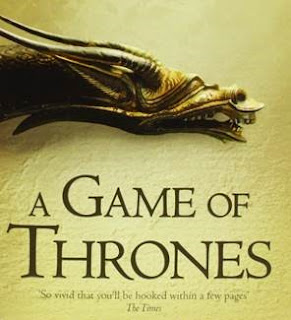People ask me from time to time, why do you read so much? And I quote them a phrase from one of my favorite books: “A mind needs books as a sword needs a whetstone if it is to keep its edge. That’s why I read so much Jon Snow.” And here's what Tyrion Lannister had to say about 'death': Here's what the Night's Watch think about the dead and the death: Do the dead frighten you? I hope at least some of you would have figured out which book am I talking about. It’s A Game of Thrones, the first book of the series “A Song of Ice and Fire”, by George RR Martin, first published in 1996. The HBO produced TV adaptation of this book is insanely famous across the world, mainly because of the bold content and gruesome visuals. However, there’s more, much more to the book that one can enjoy, and learn from. Despite being an intricately crafted monolith of a book, stretching to a mind numbing length of 800 pages, akin to the fictional “WALL” in the Westerosi universe, the story can essentially be broken down into 3 simple categories: 1. The longest part of this book tells how the noble Stark family deals with conspiracy and court politics in the Seven Kingdoms of Westeros, with particular emphasis on Eddard Stark, the father and leader of the noble family. 2. A second story follows the exiled princess Daenerys, one of the last descendants from the previous royal family, as she grows up on another continent. 3. A third story follows Jon Snow, the illegitimate son of Eddard Stark, as he grows up in the north of Westeros. He is in the special military order called the Night’s Watch, which is dedicated to protecting the civilized Seven Kingdoms from the dangers beyond the Wall. So, it’s not that hard to follow, after all. Okay, there’s a lot going on here, but the book is actually pretty clear about everything. Talking about the takeaway for the reader, I’d like to share 3 powerful and deep quotes from the book, spoken by the lead characters at different intervals of time. 1. “Most men would rather deny a hard truth than face it.” We’ve been taught from our childhoods, that we should always speak the truth. From our national flag to the photo of Gandhi on our currency notes, everything encourages us to stick with the truth with all our might, for truth always prevails. Yet, how many of us actually do it in real life? We lie so much every day that it has become an integral part of our life. We lie to our colleagues, our friends, our spouses, and, most shockingly, ourselves. It’s easier to deny a truth, much harder to face it. And that is the question this book will leave the reader with. Are you brave enough? 2. “We all need to be mocked from time to time Lord Mormont lest we start to take ourselves too seriously.” A sense of humor can win over any situation. We face numerous challenges in our daily lives. The pressure of completing an assigned job, the fear of running out of salary before the days in the month, the uncertainty of losing our loved ones over petty disagreements, or any of the other million things that run in our minds. Though we can’t control everything that life throws at us, we can surely control how we react to it. This book leaves the reader with a lasting lesson of not taking ourselves too seriously in life. Nobody gets out of it alive, anyway. 3. “Winter is coming.” Talking about the industry I’m a part of: technology and education. Winter is coming, a constantly recurring phrase throughout the series, tells us the importance of being vigilant at all times. Being complacent with our current knowledge, is the luxury we educators cannot afford. For the times change constantly, and technologies change with it. We need to keep learning if we are to stay abreast. “...a mind needs books as a sword needs a whetstone if it is to keep its edge. That’s why I read so much Jon Snow...” I hope this blog post has inspired you to pick-up the book, and give it a read. “May the gods be with you.”
Pages
- Index of Lessons in Technology
- Index of Book Summaries
- Index of Book Lists And Downloads
- Index For Job Interviews Preparation
- Index of "Algorithms: Design and Analysis"
- Python Course (Index)
- Data Analytics Course (Index)
- Index of Machine Learning
- Postings Index
- Index of BITS WILP Exam Papers and Content
- Lessons in Investing
- Index of Math Lessons
- Index of Management Lessons
- Book Requests
- Index of English Lessons
- Index of Medicines
- Index of Quizzes (Educational)
Saturday, June 1, 2019
A Game of Thrones (by George RR Martin) - book review
Subscribe to:
Post Comments (Atom)

No comments:
Post a Comment